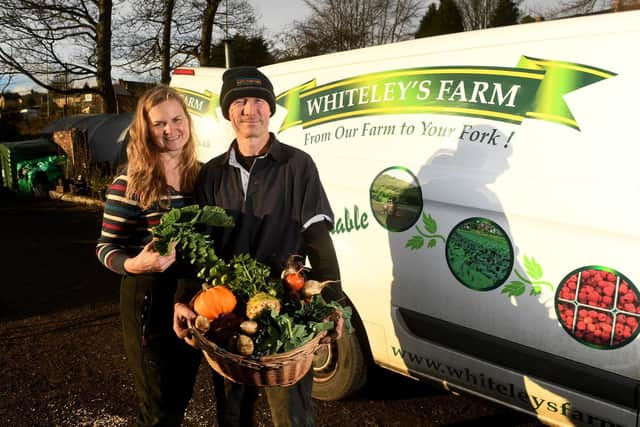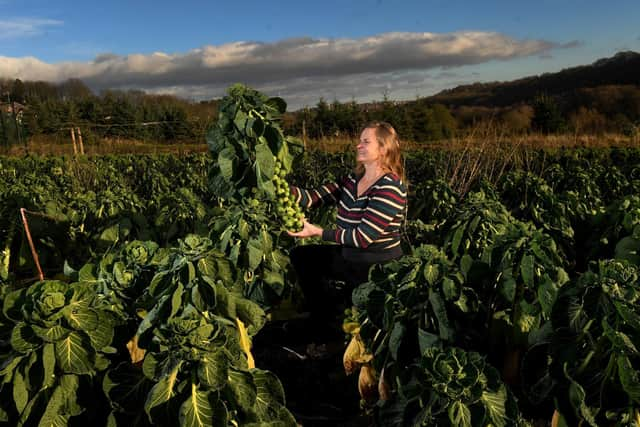Yorkshire sprout farmer reveals trick of the trade to get people to eat the divisive Christmas vegetable
While rhubarb is the biggest crop at Whiteley’s Farm in the Houghside valley near Pudsey, it is the small spherical brassica that has been the subject of division across the festive dinner table for decades.
Bryn and Vicky Whiteley are protagonists for the vegetable. The sprout is Bryn’s favourite of the huge range they grow and Vicky said she has a solution for customers to the perennial discussion, which she puts to those who express their distaste.
Advertisement
Hide AdAdvertisement
Hide Ad“I have a test for anybody who comes into our little rustic shop and says they don’t like sprouts. I give them one of our raw freshly picked sprouts to taste there and then.


“Nearly everyone who is prepared to try is converted, saying it is nice. There is no such thing as a love/hate relationship over sprouts. It’s just that people who say they don’t like them have never had a fresh one.
“That’s the difference between ours and those bought in supermarkets and that’s why after shopping elsewhere for 51 weeks of the year we get an influx of once-a-year shoppers, on top of our great regular customers, who want truly freshly picked vegetables for Christmas Day.
“That’s when people realise our sprouts are really nice. If you eat a freshly picked sprout it still has all of its natural sugars, but the longer the sprout is left between picking and consuming those sugars turn to starch. That’s what makes it bitter. You need to eat them fresh.”
Advertisement
Hide AdAdvertisement
Hide Ad

Land occupied by Whiteley’s Farm has been growing fruit and vegetables since the early 1900s. Bryn’s father, Brian, bought the 30-acre farm in the 1960s and supplied wholesalers and a stall in Leeds Market.
Bryn and Vicky added further rented land from the water board that was previously the old sewage works. It sees their overall available acreage at around 50 acres although there is quite a bit of the water board land that is difficult to work.
Bryn said the soil they have is good growing land.
“The land is loamy and really productive. We are able to grow good, healthy crops of many different vegetables, fruits and plants including Christmas trees.”
Rhubarb has always played a massive part in Bryn and Vicky’s business as it did for his dad.
Advertisement
Hide AdAdvertisement
Hide Ad“Dad worked here as a teenager working on the rhubarb when forced rhubarb traded as being part of West Yorkshire’s famous Rhubarb Triangle was at its height. It’s now a steady away crop that provides us with an income during January and February when we don’t have many other crops.”
Bryn and Vicky grow up to 15 acres of rhubarb of several varieties in their fields and bring it in to be forced, but Vicky said they changed from the traditional forcing sheds nearly a decade ago.
“Rhubarb forcing sheds were generally dead space for the rest of the year. We use a more modern method. We use double-skinned polytunnels. The outer layer is clear polytherm and the inner layer is black polythene.
“The sun provides the heat, which means the crop is more sustainable and we are carbon neutral. We no longer use big gas heaters. We build a frame inside the polytunnel which means the rhubarb is still forced in an environment where we have to bend down in a cramped space, just like being in the old sheds.
Advertisement
Hide AdAdvertisement
Hide Ad“It takes about four to six weeks to force the rhubarb and we stagger our crop with one tunnel having started a few weeks ago and another will start this week. We then start picking the forced rhubarb in all its vivid red/pink glory from around the middle of January right through to the back end of March.”
Vicky said the moment when you hear the crop growing is still an amazing time. “When it cracks open and starts to grow it’s like watching and hearing something from the film Alien.
“The forcing happens by starving the plant of light which then forces the crown to use up its energy to push the stalk upwards, so if you really want to watch you have to put on a headtorch.”
Bryn said using the polytunnels means he can grow all-year round, utilising the rhubarb roots to grow other crops.
Advertisement
Hide AdAdvertisement
Hide Ad“Once our forced rhubarb is finished I rotovate their roots inside the tunnels and grow a crop in the roots using them like a fertiliser to grow tomatoes and cucumbers in the summer months. At the back end I then rotovate it again and get nice topsoil.”
A range of brassicas make up Bryn and Vicky’s second largest crop including broccoli, sprouts, kale and cabbages with many different varieties of each.
Vicky said that providing that different varietal choice is important.
“When you’re a market garden farming operation you need to find reasons why people should buy from you. For us it is all about freshness of the crops and the number of varieties we offer. We grow five different kales, five different beetroots, five or six radishes.
Advertisement
Hide AdAdvertisement
Hide Ad“We also grow courgettes, leeks, swedes, so many different brassicas, Jerusalem artichokes, six to seven varieties of tomatoes, four cucumbers and 12 different varieties of lettuce.
“It’s all about growing something different to the supermarkets, things that are not the norm and where we can encourage additional customers to be our regulars.”
Vicky runs the farm shop and said that it stocks far more than what is produced at Whiteley’s. “It’s certainly not just our own produce and we try as best we can to stock other Yorkshire vegetables, salads and fruit.
“We have a really good customer base, families that we have known for years. Since the pandemic first hit we have gone back to something that I really like. We will go around with a basket asking what our customers want and shopping for them.”
